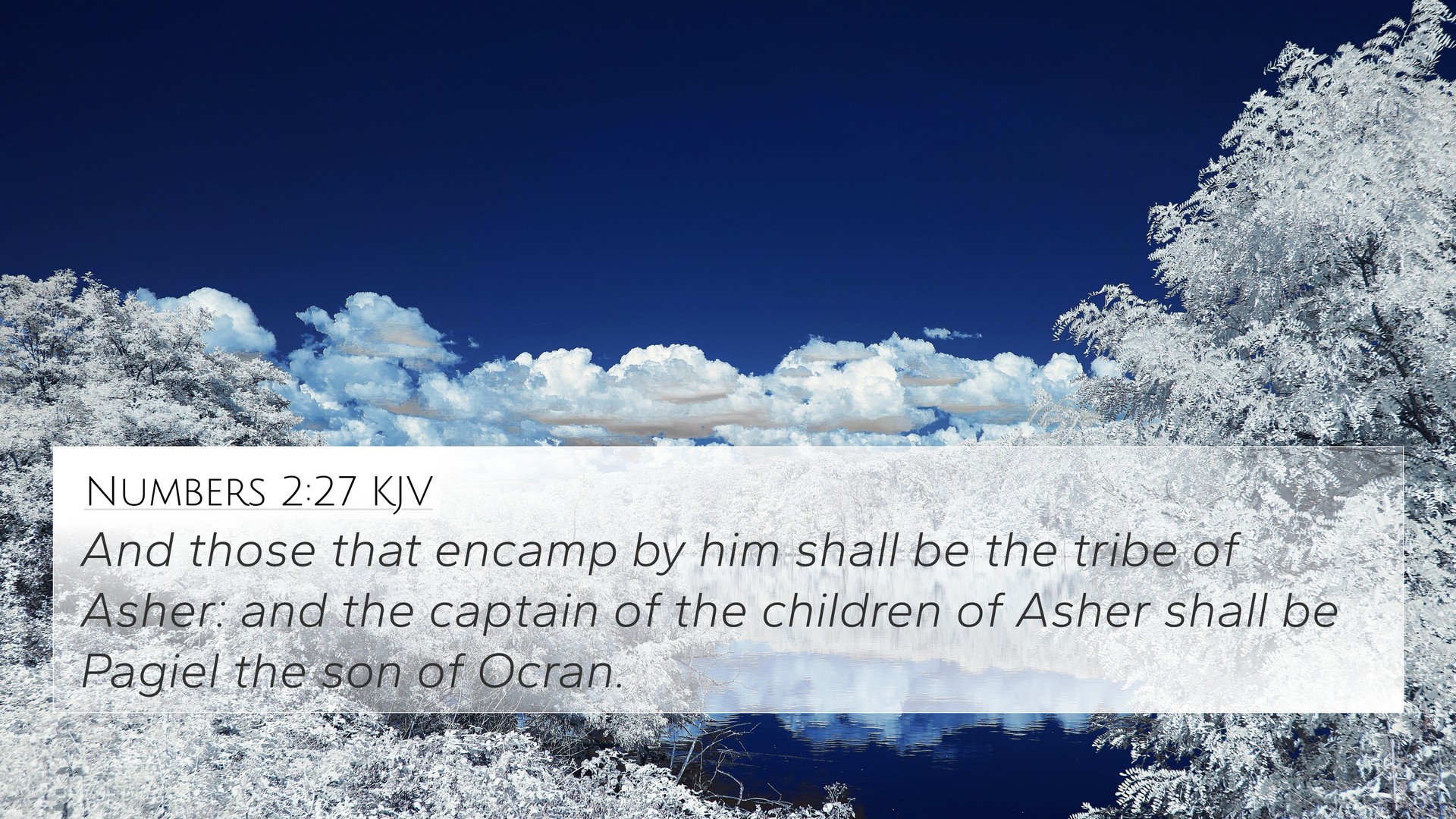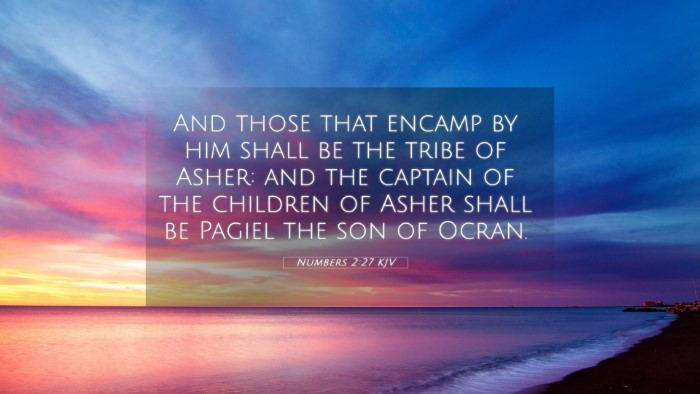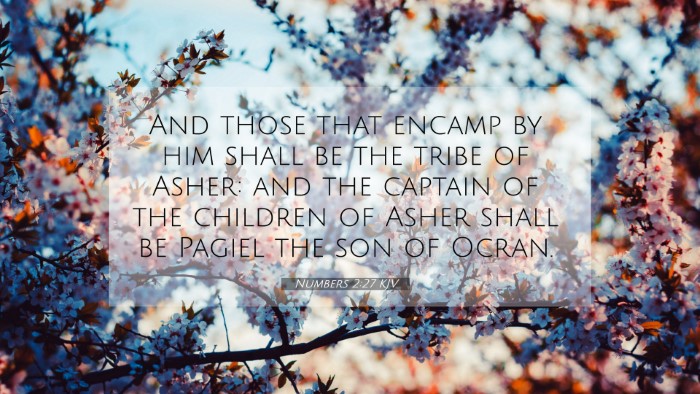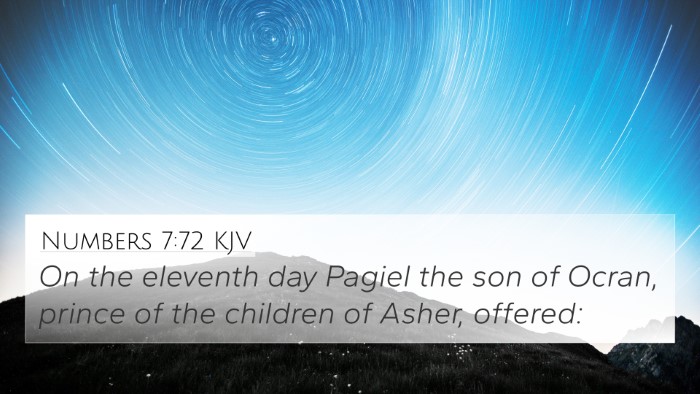Understanding Numbers 2:27 - Summary and Insights
Numbers 2:27 states: "And those that encamp by him shall be the tribe of Ephraim: and the captain of the sons of Ephraim shall be Elishama the son of Ammihud." The verse reflects the organization of the Israelite camp during their wanderings in the wilderness, with Ephraim positioned as a leading tribe. Here, we will delve into the meaning, significance, and cross-references associated with this verse.
Background and Context
This verse is part of the larger context in the Book of Numbers, where the Israelites are being organized for their journey to the Promised Land. The arrangement of the twelve tribes around the Tabernacle is detailed, emphasizing order and divine direction. Ephraim's prominence reflects its status among the tribes and its connection to Joseph, who had significant favor in God's plan.
Commentary Insights
Here are some key insights from public domain commentaries by Matthew Henry, Albert Barnes, and Adam Clarke:
- Matthew Henry: Emphasizes the importance of God’s arrangement of the tribes, asserting that each tribe's placement was divinely appointed. The presence of the tribe of Ephraim highlights God's favor and the role of leadership within the community.
- Albert Barnes: Focuses on the individual leaders of the tribes, noting Elishama's leadership and how this reflects God’s choice. Barnes also indicates that Ephraim's position at the forefront symbolizes strength and guidance during their journey.
- Adam Clarke: Discusses the figurative implications of the tribes’ arrangement, suggesting that each tribe represents a facet of God’s kingdom. Ephraim's leadership signifies both authority and responsibility within the covenant community.
Significance of Ephraim and Leadership
The mention of Ephraim indicates its leadership role among the tribes of Israel. Ephraim, descending from Joseph, was blessed with prominence and a large population, which had significant implications for the tribal structure. The importance of leadership, represented by Elishama, sets a precedent for future governance within Israel.
Cross-References and Thematic Connections
To understand Numbers 2:27 in a broader biblical context, here are some relevant cross-references:
- Genesis 48:13-20: Jacob's blessings to Ephraim and Manasseh, establishing Ephraim's prominence.
- Joshua 17:14-18: Joseph's inheritance and the significant role of the tribe of Ephraim in settling the land.
- Isaiah 7:2, 9:21: Ephraim as a significant and often leading tribe in prophetic literature.
- Hosea 11:3: God's listing of Israel's disobedience and reference to Ephraim highlights its role in the larger narrative of Israel's history.
- Hebrews 7:14: Acknowledges that Jesus Christ arises from Judah, connecting to the tribal narratives.
- Exodus 12:37-38: The origins of the Israelite migration, which sets the stage for tribal organization.
- 1 Chronicles 5:1: Genealogy and mention of the tribes’ roles and leadership indicating the continuation of God's promises.
Comparative Analysis and Connections
Exploring the connections between this verse with others allows for a deeper understanding of leadership and organization in God's plan:
- Leadership Dynamics: Links between Numbers 2:27 and Exodus 18:21, where Moses is advised to appoint leaders among the people.
- Tribal Roles: Comparative study of numbers in Numbers 1:32-34 and their changing roles in the narrative.
- Divine Appointment: Linking God's directives in Numbers with themes from Deuteronomy 1:13, emphasizing wise leadership from the tribes.
Conclusion
Numbers 2:27 illustrates the intricate leadership roles within Israel’s tribal structures and the significance of divine organization. Understanding the connections and cross-references with this verse enriches the study of scripture, revealing the broader themes of governance, community, and God’s guiding hand in the lives of His people.
Further Study and Tools for Cross-Referencing
For those seeking to conduct a comprehensive Bible study using cross-references, consider employing tools like a Bible concordance or a Bible cross-reference guide. These resources can help in identifying connections between various scriptures, enhance understanding of thematic Bible verse connections, and provide a foundation for deeper theological study.





